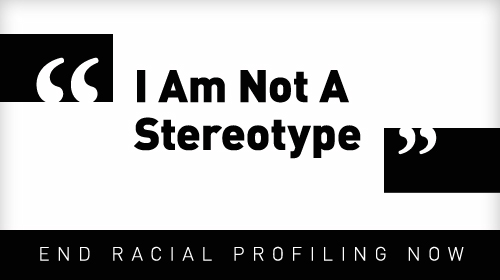
Every year, thousands of people are stopped by law enforcement while driving, flying or even walking simply because of their actual or perceived race, ethnicity, national origin, immigration or citizenship status or religion. They are not stopped because they have committed a crime, but because law enforcement authorities wrongly assume that they are more likely to be involved in criminal activity because of the way they look.
This practice, known as racial profiling, is based on crass stereotypes and assumptions, instead of facts, evidence and good solid police work. Despite claims that we have entered a "post-racial" era, racial profiling remains a troubling nationwide problem.
The practice of racial profiling has existed, in various forms, throughout our country's history. More than a century ago, Black men and women traveling through predominantly white neighborhoods were stopped and questioned for no reason — simply because police officers felt they didn't belong there.
In recent years, racial profiling has extended to new targets. As terrorism has become a subject of intense concern, American citizens and legal residents of Arab and South Asian descent have been spied upon, stopped, questioned, arbitrarily detained and subjected to unfair police scrutiny.
And today, Latino immigrants — or rather those perceived to be immigrants — are facing this discrimination on an unprecedented scale. As "show me your papers," anti-immigrant laws pop up in states across the country, Latinos, Asians and other people of color are being subjected to increased police harassment based on racial stereotypes.
Political leaders of both parties have vowed to put an end to racial profiling. In February 2001, President George W. Bush, promised to end racial profiling in America.
"In so doing," he said, "we will not hinder the work of our nation's brave police officers. They protect us every day — often at great risk. But by stopping the abuses of a few, we will add to the public confidence our police officers earn and deserve."
President Barack Obama, in response to the arrest of Harvard Professor Henry Louis Gates, said:
[T]here's a long history in this country of African-Americans and Latinos being stopped by law enforcement disproportionately. That's just a fact…And even when there are honest misunderstandings, the fact that blacks and Hispanics are picked up more frequently and often time for no cause casts suspicion even when there is good cause. And that's why I think the more that we're working with local law enforcement to improve policing techniques so that we're eliminating potential bias, the safer everybody is going to be.
Unfortunately, these promises have yet to result in practice. In recent weeks, we've seen this first hand, as our country debates the role race played in the death of Trayvon Martin and the subsequent police action. Next week, profiling will take center stage again, as the U.S. Supreme Court hears oral arguments in in Arizona v. U.S., the case that will examine the constitutionality of Arizona's anti-immigrant, racial profiling law.
In light of these events, I am hopeful that Americans of all racial and ethnic backgrounds and political persuasions will work together to end racial profiling. Tomorrow, I will testify before the Senate Judiciary Subcommittee in the Senate's first hearing on racial profiling in more than a decade. The ACLU will urge Congress to pass the End Racial Profiling Act, which would ban the use of racial profiling and provide training to help police avoid responses based on stereotypes and unreliable assumptions about racial minorities.
In addition, Congress should defund and end those immigration enforcement initiatives that foster racial profiling, including the 287(g) and Secure Communities programs. Finally, Congress should urge the administration to strengthen the Department of Justice Guidance Regarding the Use of Race by Federal Law Enforcement Agencies to address profiling by religion and national origin, close loopholes for the border and national security, make the guidance enforceable and compel the DOJ Inspector General to investigate FBI Privacy Act violations in retaining records on First Amendment protected activity.
Already, too many people have been victimized by racial profiling. They include not just those who are harassed or detained, but those who fear being harassed or detained and restrict their activities as a consequence of that fear. Racial profiling hurts and humiliates these individuals, and does irreparable damage to the relationships between law enforcement and the community.
By following the ACLU's recommendations, Congress can help law enforcement to direct its resources where they are truly necessary, ensure that our communities are safe, and reaffirm the core principles of the Constitution.
This is the first of eight blogs in the series "I Am Not a Stereotype: End Racial Profiling Now," on ACLU's Blog of Rights.
Learn more about racial profiling: Sign up for breaking news alerts, follow us on Twitter, and like us on Facebook.


